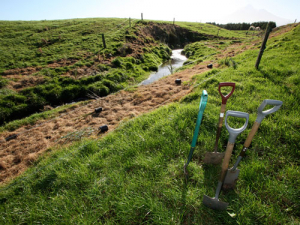State of the Dairy Nation 2024/25: DairyNZ Highlights Record Milk Production and Export Growth
DairyNZ's chief executive Campbell Parker says the 2024/25 dairy season reinforces the importance of the dairy sector to New Zealand.
 Dairy farmers are tackling environmental issues head on and have made significant progress on their commitment to protecting dairy waterways, reveals a new report by DairyNZ.
Dairy farmers are tackling environmental issues head on and have made significant progress on their commitment to protecting dairy waterways, reveals a new report by DairyNZ.
Dairy farmers are tackling environmental issues head on and have made significant progress on their commitment to protecting dairy waterways.
So says a new progress report on the Sustainable Dairying: Water Accord ‘Three Years On’.
The independently audited report shows that 97% of dairy cattle are fenced off from waterways on farms. That equals 26,197km of measured Accord waterways excluded from dairy cattle or the equivalent of 12 trips by road from Cape Reinga to Bluff.
National levels of significant non-compliance for dairy effluent systems on farms have dropped to their lowest ever, at 5.2%(down from 7% in 2013-14).
About 83% of farmers (compared to 56% in 2013-14) are now getting nitrogen information to help them farm more responsibly – with 9,517 nutrient budgets processed last year. The nitrogen management programme collects data to show nitrogen loss on-farm. This enables farmers to make improvements to their farm systems to reduce nitrogen loss and improve efficiency of use.
More than 99% of 44,386 regular stock crossing points on dairy farms now have bridges or culverts to protect local water quality.
DairyNZ chief executive Dr Tim Mackle, says it’s heartening to see what farmers have achieved in the past three years. “I acknowledge that there is still some work to do, but dairy farmers are making a positive difference.
“They have made great strides since the Sustainable Dairying: Water Accord was launched in 2013. Dairy farmers made a commitment to good management practices and the actions they have taken, both large and small, are reflected in these results. The really special thing is that they have made this commitment voluntarily, and I take my hat off to them”, says Mackle.
Dairy Companies Association of New Zealand executive director Kimberly Crewther says that since the Sustainable Dairying: Water Accord was launched in 2013, the industry has made significant progress on meeting its environmental commitments.
“The annual process of independent auditing of results gives a high degree of assurance that real progress is occurring against targets”, she says.
For further information on the Water Accord, visit dairynz.co.nz/wateraccord
Recent weather events in the Bay of Plenty, Gisborne/Tairawhiti, and Canterbury have been declared a medium-scale adverse event.
DairyNZ's chief executive Campbell Parker says the 2024/25 dairy season reinforces the importance of the dairy sector to New Zealand.
A New Zealand agribusiness helping to turn a long-standing animal welfare and waste issue into a high-value protein stream has won the Australian dairy sector's top innovator award.
OPINION: A bumper season all around.
Dairy Women's Network (DWN) has announced that Taranaki dairy farmer Nicola Bryant will join its Trust Board as an Associate Trustee.
Rural Women New Zealand (RWNZ) says it welcomes the release of a new report into pay equity.
OPINION: Staying with politics, with less than nine months to go before the general elections, there’s confusion in the Labour…
OPINION: Winston Peters' tirade against the free trade deal stitched with India may not be all political posturing by the…